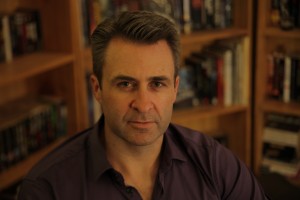 The disarmingly delightful Aaron Sterns, horror writer extraordinaire, took some time out to answer a few questions for me about writing Wolf Creek (film and novel), giant crocodiles, stalking John Jarratt, and the future of horror.
The disarmingly delightful Aaron Sterns, horror writer extraordinaire, took some time out to answer a few questions for me about writing Wolf Creek (film and novel), giant crocodiles, stalking John Jarratt, and the future of horror.
What do readers need to know about Aaron Sterns?
I’m unashamedly a horror writer. It seems to be fashionable for authors to distance themselves from the genre once they’ve had their start — to instead proclaim themselves exponents of dark fantasy, or weird fiction, or supernatural romance or whatever. Even Barker qualified himself as a writer of the ‘fantastique’. But I’m of the school of thought that horror is a largely-inclusive realm (beneath the overall huge banner of fantasy) that encompasses any example of fiction or film that addresses the dark side of experience (thanks Douglas E. Winter). With the slipstreaming of genres post-postmodernism I’m not sure how people can easily ghettoise certain works anyway. Is Game of Thrones epic fantasy, or does it use so many elements of horror and is so nihilistic in its view of human nature and life that it’s more attuned to the more maligned genre? And who cares anyway, except that it has an impact on you, which should be the inspiration of all art. Not being ashamed of the label, I’ve been fairly singular in my pursuit of horror since I started to seriously pursue fiction in my teens — some thirty years ago now — in an effort to understand (or tackle) some of the existential fears I was feeling (and still feel). Fears that only seemed to be overtly addressed in the dark fiction I was reading at the time — novels such as Huxley’s Brave New World, Orwell’s 1984, most of Ballard, etc. I’ve been lucky enough to pursue this search in many fields too, beginning in academic study to round out my understanding, then moving into short fiction and novels, and on to screenwriting as well. I’m now in the fortunate position of working both as a novelist and screenwriter, something that is a rarity in Australia (though it’s taken decades of work to achieve).
Tell us about your involvement with the Wolf Creek films. 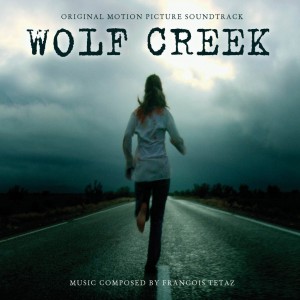
Greg McLean and I met through a friend of mine from uni and I ended up sharing their writing office space. I was the horror fiction/ theory guy, our friend Dan was the artist, and Greg was the film-maker. We’d pass work back and forth to critique and eventually Greg enticed me to put some of my outspoken theories into practice and write some screenplays with him (including a ‘fast zombie’ idea that was unfortunately squashed by the Dawn of the Dead remake a year later). I guess I was an unofficial consultant on the first Wolf Creek, and I also have a fun little cameo in it (as I have in most of Greg’s films, actually). During post on the film there was a lot of talk about sequel ideas, and at one stage Greg and I came up with something we thought was pretty cool and could actually be a worthy sequel and not just a safe, cynical rehash (as lots of people were seriously suggesting the sequel should be). We wanted something that set itself up as repeating events, only for it to take a tangent and venture into new territory. Great, Greg said, you’re the horror guy. Go write it.
How did that translate to the novel Wolf Creek: Origin?
Initially, I was acting more as a curator for a potential series of Wolf Creek novels. Greg had been approached by Penguin for six novels, so we sat down in our trusty haunt Mario’s in Fitzroy one day and blocked out the entire series on napkins. The first was to be the juiciest: Mick’s tortured upbringing and first stumbling attempts at killing. As my background’s fiction and I’d already co-written the film sequel, Greg argued I was the obvious choice to write Mick’s origin story. I was busy with my own novel at that stage, so said no a couple of times. But I eventually realized I’d never again have the chance to develop the mythology of perhaps Australia’s most iconic villain again. And I’d always wanted to write a serial killer novel — a subject that’s disturbed me since I was a teenager because the psychology is so foreign to me, and still is. The deadline was so tight from conception to submission (about three months) that I didn’t have time to second-guess myself or be overawed by the opportunity. I mapped out the story during a lightning research trip to Queensland (to visit John Jarratt’s birthplace, and check out a cattle station nearby), then launched straight into it.
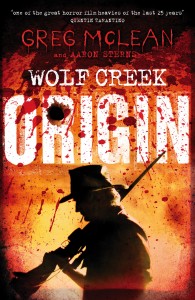 Does collaboration come naturally to you after working on film scripts such as Rogue, with Greg McLean?
Does collaboration come naturally to you after working on film scripts such as Rogue, with Greg McLean?
Starting out as a fiction writer I was no doubt as precious about my golden words as anyone. A publication rejection would send me into a spiral of self-doubt. But film is all about collaboration and taking notes and not taking anything personally. You have to have a clear vision and faith in yourself, but you also have to be objective enough to know when you’re wrong. It’s not easy to both believe in something and simultaneously be open to its destruction. Critiquing and reading others’ works (as a script-editor for instance) also helps in this, I think, because it’s always easier to tear someone else’s work apart than your own. You just need to divorce yourself from your own work enough to see it as someone else’s. So I’m becoming quite comfortable with working with others — at least in screenwriting — and am now even inviting co-writers to work on me with my own material I’ve been developing for some years, because I recognize the value another point of view brings. Fiction’s a whole different matter though. I think prose really needs to be filtered through one vision, but you never know.
What draws you to writing horror?
That’s such a huge question, it’s almost hard to quantify. I’ve always had a dark sensibility, and I struggled with existential issues quite young (and still do). I think I turned to horror because it was raising questions I myself was struggling with (the purpose of life — or lack of it, the terror of random violence, the senselessness of death, the lie of an afterlife). For me, it’s the one field that asks the big questions, and isn’t necessarily required (at least in its best examples) to provide safe and comforting answers. Cosmic horror for instance, such as the H.P. Lovecraft stories I devoured as a kid, serves only to disrupt and question existence. There are no answers, only awe. I’ve never subscribed to the whole ‘rollercoaster’ theory of horror, in which it’s supposed to provide a safe and thrilling experience of fear, before ejecting the viewer out into the bright light of the real world. The definition of horror is of a “lasting dread” — not a momentary sensation of terror or suspense, but a long-lingering emotion. The works that had most impact on me wormed their way inside my head and changed my view of the world forever (such as American Psycho, Crash, etc.). Then a fellow writer once read one of my stories and said later she couldn’t see her own family the same way ever again (it’s okay, she’s still with them). That’s my aim — to not be a safe flash-in-the-pan thrill for the reader/ viewer, but to change their perspective, perhaps permanently. To educate, if you will.
Who were/are your literary heroes/influences? 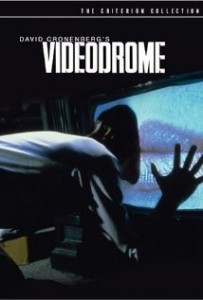
Cormac McCarthy, J G Ballard, Bret Easton Ellis and William Faulkner probably had the most effect on me along the way — all of which I would either consider Modernist or Postmodernist writers. Specifically in the horror field I’d say Jack Ketchum, Clive Barker, early King. And then there are screenwriters such as Andrew Kevin Walker, Eric Red, Paul Schrader, and filmmakers such as David Cronenberg. I unfortunately don’t get much time to read anymore, and I don’t have the patience or the… forgiveness I once used to have, so tend to half-finish things a lot, but if there’s a new Ketchum available I’ll devour that piece of beauty in a heartbeat.
What is your favourite horror film and why?
Although I love a lot of Cronenberg’s films (Videodrome was one of those very works that changed my view of the world), my absolute favourite film would be a toss-up between Jacob’s Ladder and Carpenter’s The Thing. Jacob’s Ladder is a very emotional, existential work that affects me every time I watch it. And the grounding of its supernatural qualities in the gritty world of New York has been very influential on my own writing. My first short story ‘The Third Rail’ was set in New York, for instance. But The Thing is possibly the perfect horror film, in that it expertly oscillates between character-driven suspense and paranoia, and boasts some of the most imaginative and visceral special effects ever created. Some of the visuals were so imaginative and iconic — such as the spiderhead — that it eclipsed anything else I’d seen. Yet despite this the film’s themes are cerebral, striking to the heart of what it means to be human (much like the ’70s Invasion of the Body Snatchers, another film that shifted my worldview). I also love that the horror is shown in full, and isn’t held back by any of the usual “don’t show anything, it’s much better in the imagination” guff. I’ve always been of the opinion that if it happened you show it. The characters can’t escape what’s happening, so why should the viewer?
How does it differ: writing prose to writing a film script? Do you need to consciously change how you approach the project?
The writing skills are completely diametric in many ways. Screenplays require short sharp sentences, can have no internal description, and must adhere to a very formalized structure on the page which can get in the way of the flow of the actual writing process. Fiction in many ways is much more demanding, because it requires so much more description and ‘presence’ in that world. You have to know every detail intimately (even if you don’t describe it). And on top of that it has to read beautifully and have variances in pace and length and all the thousand other things a fiction writer has to be aware of at any one time. There are certainly some stories I feel are more attuned to one medium — a small, sharp idea might be more appropriate for a short story, something epic and convoluted for a novel series, a punchy, visceral idea for a film. Of course, sometimes you can get added currency by developing an idea across several platforms, but often a novel or short story won’t translate to film — it’s a too-complex or too-simple idea, or it’s not right for the current marketplace, or it doesn’t have a strong enough hook, or something else has just been released that steals its thunder. It’s possibly a matter of choosing your battles wisely.
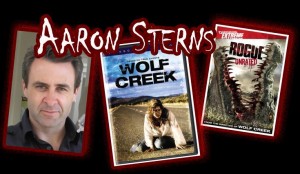 The future of horror is …?
The future of horror is …?
It’s hard to pick for the genre itself. I can really only speak to where I hope it goes. I hope it’s honest, challenging, prepared to still push boundaries in these politically correct times, just as it’s always striven for. I think social commentary via culture — whether visual/ performance art, or fiction, or film — is more important now than ever, considering how fractured and downward-spiraling the world seems to be, at least to a pessimist (nee realist) such as myself. The metaphor of art can sometimes glean the most truth. Suppression of expression benefits no one.
What’s next for Aaron Sterns?
It’s going to be a busy, busy year. I’m attached as a writer to no less than six films in development. Some are paying jobs and hopefully stand good chances of getting made. Others are spec scripts, some of which I’ve been developing myself for years now and believe are strong. In fact, I’m contracted to turn in three scripts in the next three months. It’s going to be hellish (I tend to write quite slowly, agonizing over every line, dammit), but I just have to push through one a month, and then collapse in a heap in September — although I’ve just been offered another two more gigs in the past week, so I’m not sure I’ll even get much time off when these three are done. I’ve just resecured a fiction agent and she’s sent out my next novel Vilka?i. I have plans for two more works in that world if I get the chance. Plus there’s nonfiction articles coming out, a couple of short stories under consideration, things like that. And I hope to rekindle my involvement with my old university, Deakin. They’ve asked me to return as a Conjoint Senior Lecturer to mentor the new crop of film and literature students. Not sure where I’m going to get the time for that on top of everything (including a hilarious three-year old vying for my attention), but I’d love the opportunity to help out enthusiastic new creatives. It’s all quite overwhelming, but I never lose the sight of the fact I’ve worked hard for these opportunities, and nothing is a given in this life. You make your own luck, and it’s now up to me to work even harder to bring some of these things to fruition. We’ll see how successful I am in another year, I guess.

